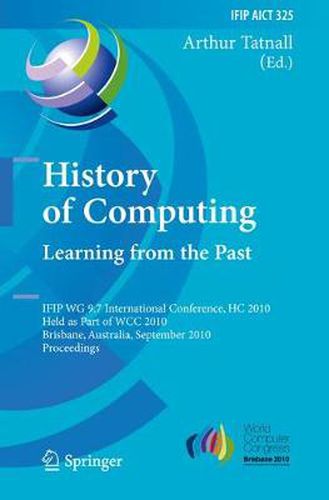Readings Newsletter
Become a Readings Member to make your shopping experience even easier.
Sign in or sign up for free!
You’re not far away from qualifying for FREE standard shipping within Australia
You’ve qualified for FREE standard shipping within Australia
The cart is loading…






This title is printed to order. This book may have been self-published. If so, we cannot guarantee the quality of the content. In the main most books will have gone through the editing process however some may not. We therefore suggest that you be aware of this before ordering this book. If in doubt check either the author or publisher’s details as we are unable to accept any returns unless they are faulty. Please contact us if you have any questions.
History of Computing: Learning from the Past Why is the history of computing important? Given that the computer, as we now know it, came into existence less than 70 years ago it might seem a little odd to some people that we are concerned with its history. Isn’t history about ‘old things’? Computing, of course, goes back much further than 70 years with many earlier - vices rightly being known as computers, and their history is, of course, important. It is only the history of electronic digital computers that is relatively recent. History is often justified by use of a quote from George Santayana who famously said that: ‘Those who cannot remember the past are condemned to repeat it’. It is arguable whether there are particular mistakes in the history of computing that we should avoid in the future, but there is some circularity in this question, as the only way we will know the answer to this is to study our history. This book contains papers on a wide range of topics relating to the history of c- puting, written both by historians and also by those who were involved in creating this history. The papers are the result of an international conference on the History of Computing that was held as a part of the IFIP World Computer Congress in Brisbane in September 2010.
$9.00 standard shipping within Australia
FREE standard shipping within Australia for orders over $100.00
Express & International shipping calculated at checkout
This title is printed to order. This book may have been self-published. If so, we cannot guarantee the quality of the content. In the main most books will have gone through the editing process however some may not. We therefore suggest that you be aware of this before ordering this book. If in doubt check either the author or publisher’s details as we are unable to accept any returns unless they are faulty. Please contact us if you have any questions.
History of Computing: Learning from the Past Why is the history of computing important? Given that the computer, as we now know it, came into existence less than 70 years ago it might seem a little odd to some people that we are concerned with its history. Isn’t history about ‘old things’? Computing, of course, goes back much further than 70 years with many earlier - vices rightly being known as computers, and their history is, of course, important. It is only the history of electronic digital computers that is relatively recent. History is often justified by use of a quote from George Santayana who famously said that: ‘Those who cannot remember the past are condemned to repeat it’. It is arguable whether there are particular mistakes in the history of computing that we should avoid in the future, but there is some circularity in this question, as the only way we will know the answer to this is to study our history. This book contains papers on a wide range of topics relating to the history of c- puting, written both by historians and also by those who were involved in creating this history. The papers are the result of an international conference on the History of Computing that was held as a part of the IFIP World Computer Congress in Brisbane in September 2010.